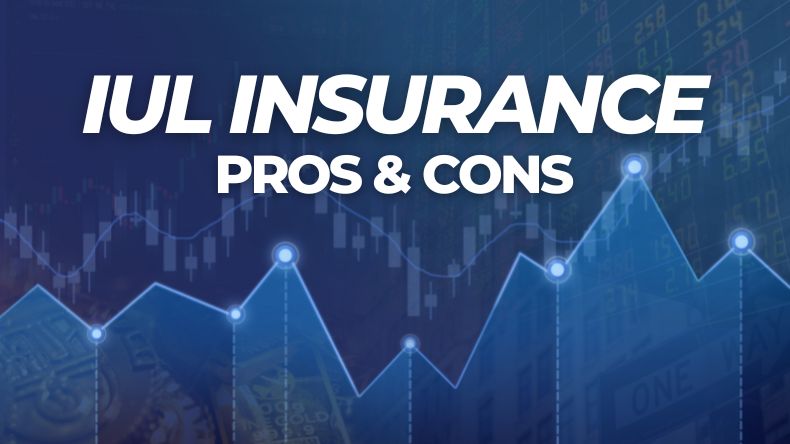All Categories
Featured
Table of Contents
Indexed Universal Life (IUL) insurance coverage is a sort of irreversible life insurance coverage policy that incorporates the functions of traditional universal life insurance policy with the capacity for money value growth connected to the performance of a stock exchange index, such as the S&P 500 (High cash value Indexed Universal Life). Like other types of long-term life insurance, IUL provides a survivor benefit that pays to the recipients when the insured passes away
Money worth buildup: A section of the premium payments enters into a cash worth account, which makes interest in time. This cash value can be accessed or obtained versus during the insurance holder's life time. Indexing alternative: IUL plans use the possibility for cash worth growth based upon the performance of a stock market index.
How do I compare Indexed Universal Life Premium Options plans?
Just like all life insurance policy products, there is also a collection of risks that insurance holders ought to understand before considering this type of plan: Market threat: One of the key risks connected with IUL is market threat. Since the cash value growth is connected to the efficiency of a stock exchange index, if the index executes poorly, the cash money value might not expand as expected.

Adequate liquidity: Insurance holders must have a steady monetary circumstance and be comfy with the exceptional payment requirements of the IUL policy. IUL enables flexible premium settlements within particular restrictions, but it's essential to keep the policy to ensure it attains its designated purposes. Rate of interest in life insurance coverage: People that need life insurance protection and a rate of interest in cash money value growth might find IUL appealing.
Prospects for IUL need to be able to recognize the technicians of the plan. IUL may not be the very best option for people with a high tolerance for market danger, those who focus on affordable investments, or those with even more prompt economic needs. Consulting with a certified economic advisor that can provide tailored guidance is necessary before taking into consideration an IUL plan.
All registrants will receive a calendar invitation and link to join the webinar by means of Zoom. Can not make it live? Register anyway and we'll send you a recording of the presentation the following day.
How do I compare Indexed Universal Life Accumulation plans?
You can underpay or miss costs, plus you may be able to change your survivor benefit. What makes IUL different is the way the money value is invested. When you secure an indexed universal life insurance policy policy, the insurance company gives a number of choices to choose a minimum of one index to utilize for all or component of the cash worth account section of your policy and your survivor benefit.
Cash money value, along with prospective growth of that value through an equity index account. A choice to assign part of the money worth to a set rate of interest option.
Insurance holders can decide the percent assigned to the taken care of and indexed accounts. The value of the selected index is taped at the start of the month and contrasted with the worth at the end of the month. If the index increases during the month, rate of interest is contributed to the money worth.
The resulting interest is added to the cash value. Some policies calculate the index acquires as the amount of the adjustments for the duration, while various other policies take an average of the everyday gains for a month.
How do I get Iul Protection Plan?
The price is established by the insurance coverage firm and can be anywhere from 25% to more than 100%. (The insurance provider can likewise alter the take part rate over the life time of the policy.) For instance, if the gain is 6%, the participation price is 50%, and the present money value total is $10,000, $300 is included in the cash money worth (6% x 50% x $10,000 = $300).
There are a variety of benefits and drawbacks to think about before purchasing an IUL policy.: Similar to conventional universal life insurance policy, the insurance holder can increase their costs or lower them in times of hardship.: Amounts attributed to the money worth grow tax-deferred. The money worth can pay the insurance coverage premiums, enabling the policyholder to lower or quit making out-of-pocket premium repayments.
Indexed Universal Life Cash Value
Many IUL plans have a later maturity date than other kinds of global life plans, with some ending when the insured reaches age 121 or more. If the insured is still active during that time, plans pay out the fatality advantage (however not generally the money value) and the profits may be taxable.
:max_bytes(150000):strip_icc()/dotdash-comparing-iul-insurance-iras-and-401ks-Final-71f14693e37d4fb1b0736112179802b5.jpg)
: Smaller plan face values do not supply much advantage over normal UL insurance policy policies.: If the index decreases, no rate of interest is attributed to the money value. (Some plans use a low ensured price over a longer duration.) Various other investment cars make use of market indexes as a criteria for efficiency.
With IUL, the objective is to make money from higher motions in the index.: Since the insurance policy business just gets choices in an index, you're not directly bought supplies, so you do not benefit when companies pay rewards to shareholders.: Insurers cost fees for managing your money, which can drain pipes money worth.
Guaranteed Indexed Universal Life

For most individuals, no, IUL isn't much better than a 401(k) - Flexible premium Indexed Universal Life in terms of saving for retirement. The majority of IULs are best for high-net-worth individuals searching for means to lower their taxable revenue or those who have maxed out their various other retired life alternatives. For everybody else, a 401(k) is a far better investment vehicle because it does not lug the high fees and premiums of an IUL, plus there is no cap on the amount you might make (unlike with an IUL plan)
, the incomes on your IUL will not be as high as a common investment account. The high cost of premiums and charges makes IULs costly and substantially much less economical than term life.
Indexed universal life (IUL) insurance supplies cash money worth plus a survivor benefit. The cash in the money value account can earn rate of interest through tracking an equity index, and with some usually designated to a fixed-rate account. Nevertheless, Indexed universal life policies cap just how much money you can accumulate (usually at much less than 100%) and they are based on a possibly volatile equity index.
How can I secure Guaranteed Interest Iul quickly?
A 401(k) is a far better alternative for that function since it does not bring the high costs and costs of an IUL plan, plus there is no cap on the amount you may gain when invested. Many IUL policies are best for high-net-worth people looking for to decrease their taxable income. Investopedia does not supply tax obligation, investment, or economic services and suggestions.
If you're taking into consideration getting an indexed global life plan, first consult with a monetary expert who can discuss the subtleties and give you a precise photo of the actual possibility of an IUL policy. Make certain you comprehend how the insurance company will compute your rate of interest, incomes cap, and charges that could be examined.
Latest Posts
Index Universal Life Insurance Fidelity
Compare Universal Life Insurance Rates
Iul Insurance Quotes